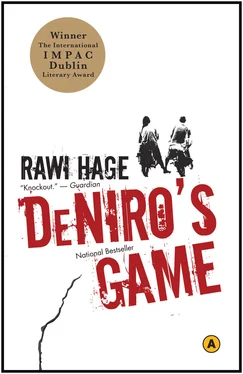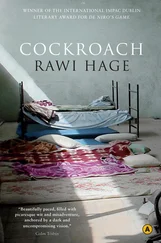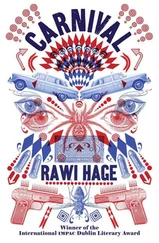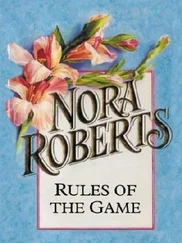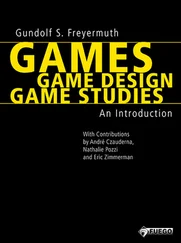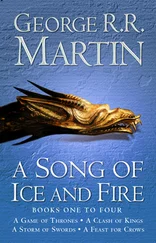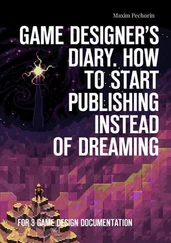Rhea smiled, and when I stopped, she became like a kid at bedtime, wanting me to repeat things, to never stop. I told her that George and I had worked together, and that he decided to join the militia because he needed the money. I skipped many things about George, and when I saw how happy she was, I changed names, I planted trees, I painted the concrete houses in our old neighbourhood in tropical colours, I made people dance and laugh, even under the falling bombs.
Does he know about me? Rhea asked.
He never mentioned you, I said.
Did he ever ask about his father?
No, but when the kids at school teased him and called him “the bastard,” he fought them no matter how big they were, he fought them until no one dared to say a word.
Was he ashamed of not having a father?
If he was, he never showed it. We never talked about it. But everyone called him George Al-Faransawi (George the French).
You called him that too?
No. He used his mother’s family name.
What is it? Rhea tapped her cigarette.
Machrouky.
Machrouky, she repeated after me. George Machrouky. It must have hurt him to be teased like that. Kids are cruel, humans are cruel, life is cruel. She quickly drank her tea. Then she held my hand, stood up, and pulled me up with her.
Let’s go. I want to show you Paris.
Rhea and I walked some more, and ended up in the Jardin du Luxembourg. The stretches of green under the many naked statues, the pigeons, and the pawns took me back to my room back home. The house must be empty now, I thought, and I wondered if Nabila had gotten the keys, if she had covered everything with drapes, if the smell of a closed, deserted home was filling the rooms, if spiders and ghosts were resting together. And I wondered if my parents, as ghosts, still had legal rights over the place, and I wondered what they would do if they came back to haunt it and discovered that I had finally succeeded in leaving and had entered those posters with the happy fountains and the pigeons, like this place here, leaving the fridge unhooked, the garbage uncollected, without a goodbye note.
On the grass I saw a partridge acting crazy with a pigeon, fighting for little breadcrumbs from under an old lady’s feet. I am hungry, the partridge said, and there is nothing here for me but crumbs from a destitute hand.
We walked on, and I watched Rhea strolling next to me, telling me about the architecture, the Germans who had invaded, the little brass plates engraved with the names of French resistance fighters who had died while fighting to liberate their country. We stopped at a place that sold used books on the shore of the river, a place that I had passed the night before. Out of respect for Rhea, I ordered my soldiers to clean up the war scene and to cease all fire, theft, and disturbance. I ordered them to go underground and fight the invading fascists. My soldiers rejoiced.
After browsing in the bookstore, Rhea and I sat on a bench, watching the water slowly precipitating under the arched bridges. The stone monsters on the tops of the churches kept an eye on the enemies while my soldiers ate and rested.
What do you do, Bassam? Rhea asked me.
I won’t tell her of my revolutionary tendencies, nor of my crucial role in the revolution, nor of my support for the French resistance, I thought to myself and caressed my white horse. I worked at the port, I said.
And what did you do there? she asked with round, open eyes.
I drove a winch.
Your parents are still there?
They are both dead and buried underground, not too far from the undertaker’s house.
When my father died, I cried for days, Rhea said. We had a distant relationship, my father and I. He was always formal, even with me, always elegant and well dressed, and he spoke like an aristocrat. (I would spare his life because he is Rhea and George’s father, I thought.) He was well mannered, as all diplomats are. But he would leave us for weeks and months. At first we travelled with him, but then my mother decided to stay in Paris. She found a lover. And my father started to travel more.
George should have known him, I said.
Yes. Yes, he should have known us all, she replied quickly. Does George have a girlfriend?
No, I said.
What do you think he is doing now?
Now?
Yes, at this moment.
He is away, I said.
He is away. We know that, she giggled. Let’s go and eat. You must be hungry by now. We’ll take a cab.
She stepped to the edge of the street, lifted her hand in the air, stood on her toes, and spun like a ballerina, waving her palm like lovers do on a train station platform. In the cab, we sat as far as possible from each other, each next to a window. I watched Paris go by through a glass drenched by the steady rain that made everything look blurred and unknown; but Rhea, who knew the city and its people, contemplated the sopping glass and the rain droplets rushing down like tears from eyes.
IN THE AFTERNOON, Rhea asked me if I wanted to come to her place for tea.
We walked through Arras Street under an umbrella that hid the tops of the high churches, the little angel statues in the eaves of buildings, the leaves of trees that bowed under the weight of the falling rain, the high, triumphant monuments, and the smoke from the ever-burning Bastille.
We left the umbrella in Rhea’s hallway, dripping water, and entered her place. It was smaller than her mother’s and had fewer objects. I sat and waited while she disappeared into the kitchen and then into her room. She came out wearing new, dry clothes, put on some Indian music, lit some incense, and went back into her room. After a minute she reappeared and told me to go into the kitchen and help myself to a cup of coffee. I heard a dryer blowing inside her room; outside, a storm of wind and rain rose louder, and the trees shook.
I sipped my coffee and walked over to the bookshelves in the living room. On one, I saw a photo of Rhea with a man who, I thought, must be Mr. Mani. It had been taken in the Orient somewhere. A Buddhist temple filled most of the photo. It had obviously been taken from a distance, as it showed both of them in full.
Mr. Mani did not look like George, except maybe for his large smile. I remembered how rare George’s smiles were, how once in a while he surprised you with them, for no reason but to acknowledge your presence. Mr. Mani looked Slavic, with pale skin. George had looked like his olive-skinned mother, Jamal.
That was our trip to Thailand. This is my dad, Rhea said as she approached me. She touched one side of the frame. I turned my head toward her and I kissed her on the cheek, and as I pressed my face against her warm skin, slowly she turned her head, and we kissed on the lips.
You have to take off your clothes. You are wet, Rhea murmured. Come to my room. I will give you a towel.
I STAYED WITH Rhea for the next couple of days. We took long walks every day. We hopped from one café to another. We entered museums and galleries, and she showed me her favourite paintings. We skipped through wings filled with massive gold portraits of governors, aristocratic ladies, and white Roman statues. We went straight to her favourite pieces, and when she saw them, she rejoiced as if she had just found a lost childhood friend. She would shine a big, enthusiastic smile on me, and tell me about the painter’s life, the era he had lived in, the techniques he had used, and the symbolism in his work. One day we went to a photography exhibit, and she walked calmly in front of every frame, posing in front of each photo. Photography is about death, she said to me. It preserves the illusion of a past moment that can never be re-enacted.
At night, I slept in her bed and we made love. Before going to bed, she would light a candle. I like it dark enough to see only shapes, and not too many details, she told me.
Читать дальше
